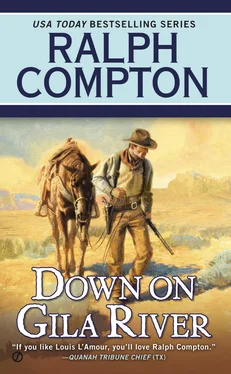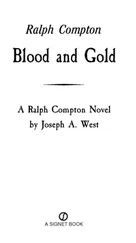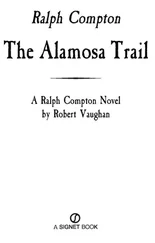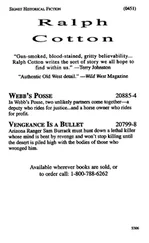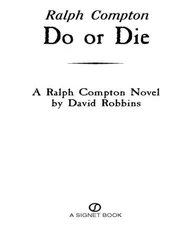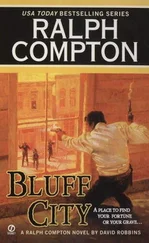JUST KEEP SHOOTING.
Sam felt the shock of the bullet, like a blow from a fence post swung by a strong man, to his lower left ribs.
He staggered, almost fell on slippery rock, but recovered his balance.
“You done for me, but I’ve got ye now,” Wells said. “Damn you, you can cook me supper in hell.”
Sam had one round left in the cylinder. He two-handed his Colt to eye level and squeezed the trigger.
At first he thought he’d missed again, because Wells stood his ground. The big man shot twice, three times, all his bullets flying wild.
But Sam’s last round had hit home.
His chest running scarlet with blood from two wounds, Wells finally dropped to his knees and pitched forward into the river, fountains of water erupting around him.
Blood stained the river, spreading out from the big man like rust, and Sam stepped aside as the huge spread-eagled body slowly floated past.
For a few moments Sam watched Jeptha Wells bob facedown in the river and then he shook his head. “Mister,” he said, “never trust a wolf until it’s been skun.”
Ralph Compton
DOWN ON GILA RIVER

A Ralph Compton Novel
by Joseph A. West

A SIGNET BOOK
THE IMMORTAL COWBOY
This is respectfully dedicated to the “American Cowboy.” His was the saga sparked by the turmoil that followed the Civil War, and the passing of more than a century has by no means diminished the flame.
True, the old days and the old ways are but treasured memories, and the old trails have grown dim with the ravages of time, but the spirit of the cowboy lives on.
In my travels—to Texas, Oklahoma, Kansas, Nebraska, Colorado, Wyoming, New Mexico, and Arizona—I always find something that reminds me of the Old West. While I am walking these plains and mountains for the first time, there is this feeling that a part of me is eternal, that I have known these old trails before. I believe it is the undying spirit of the frontier calling me, through the mind’s eye, to step back into time. What is the appeal of the Old West of the American frontier?
It has been epitomized by some as the dark and bloody period in American history. Its heroes—Crockett, Bowie, Hickok, Earp—have been reviled and criticized. Yet the Old West lives on, larger than life.
It has become a symbol of freedom, when there was always another mountain to climb and another river to cross; when a dispute between two men was settled not with expensive lawyers, but with fists, knives, or guns. Barbaric? Maybe. But some things never change. When the cowboy rode into the pages of American history, he left behind a legacy that lives within the hearts of us all.
—Ralph Compton
Chapter 1
A fifty-year-old, stove-up puncher with the rheumatisms and shortsighted eyes has no right to pick a fight with a bunch of young bronco Apaches.
Sam Sawyer was aware of that rule, but since the Indians had done the pickin’ he figured he was in the right.
Not that it mattered.
The Mescaleros already had his pony, saddle, and rifle, and now they were after his scalp. All things considered, Sam figured he was in a difficult situation. He still had his Colt but couldn’t hit anything with it unless at spitting distance, and the Apaches weren’t about to get that close.
Already their rifle bullets hit nearer. Accompanied by a spiteful whine, they chipped rock from the top of the boulder that concealed him or rattled through the juniper on the higher ground just above his head.
He was, Sam decided, truly between a rock and a hard place.
But desperate times require desperate measures. By nature Sam Sawyer was a talking man and he figured he might be able to silver-tongue his way out of this fix.
Where bullets had failed, words could succeed.
“Hey, you Injuns down there,” Sam yelled. “Jes’ leave my pony an’ saddle and we’ll forget this shootin’ scrape ever happened. How does that set with you, huh?”
The only reply was a flurry of shots that forced Sam to hit the ground, his heart thudding like a trip-hammer in his chest.
He learned a great truth that day: when Apaches wanted to lift a man’s scalp, they weren’t much on polite conversation.
Slowly, Sam lifted his head and peered over the boulder. He saw the three Indians moving around farther down the talus slope, just a fleeting moment of a glimpse, and then they were gone again.
Sam thumbed off a shot, taking a pot to keep the Indians honest. He saw a pad leap off a prickly pear cactus, but then his bullet chattered harmlessly into the underbrush.
Answering shots whined off the rock, and one of them drove splinters into Sam’s left cheek, drawing blood and a startled curse. He dived for the ground again, still cussing.
An optimistic man, Sam spat out dirt and dried leaves and tried to look on the bright side. But try as he might, there was no bright side—nary a happy ending in sight.
“Dang,” he said, talking aloud, the habit of men who ride lonely trails, “I reckon you’re done fer this time, Sam’l.”
* * *
Sam Sawyer was holed up in the rugged breaks at the foot of New Mexico’s Haystack Mountain in the high desert country. Spreading away from him lay a brush valley that pointed like an arrowhead toward what had been his destination, the Silver City boomtown.
He’d figured that he might prosper there, perhaps in the restaurant business, since a ranch cook had once told him, “Sam, I reckon you can fry an egg and burn a steak with the best of them.”
But hard fate had intervened and his prospects were blighted.
Sam had been riding south from the Spur Lake Basin country when the Apaches jumped him, scared his horse, and left him afoot.
Now pinned to the break like a butterfly to a board, he could only wait and wonder when the Indians would make their move.
There was an almost impassible thicket of brush and cactus to his left, and to his right another pile of rock that had tumbled down the mountain during some ancient earth-shake. Behind him rose a sheer slope, so he was confident that no attack would come from that direction.
Sam took time to build a cigarette and shook his head. The Apaches were taking their own sweet time, content to make a man die a hundred deaths before the real thing happened. The day was blistering, the sun a white-hot coin in the cloudless sky. Ravens quarreled in the junipers, raining a shower of twigs, cones, and needles. Close to Sam, a swallowtail butterfly circled close to a purple bull thistle, then fluttered away in tattered flight.
A probing arrow thudded into the slope behind Sam, then a second.
Angry now, he cupped a hand to his mouth and shouted, “Hey, you buzzards! You’re gonna put somebody’s eye out!”
There was no answering shout, nor further arrows.
Sam peered over the rim of the boulder again. Nothing moved and there was no sound.
Maybe the Apaches were gone. The arrows might have been a last act of defiance, calculated to make the white man wet his pants.
If that was the case, they’d almost succeeded.
A minute dragged past slowly, heavy with heat.
Still nothing moved and only insects made their small sounds in the grass.
Emboldened, Sam stood. And drew an instant fusillade.
A bullet jerked off his hat and another tugged at his left sleeve. He dived for the ground again and yelped as one of his rheumatic knees slammed again a buried rock.
Читать дальше
